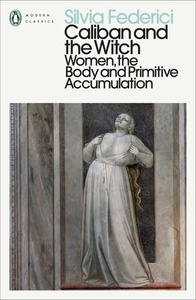Take a photo of a barcode or cover
challenging
informative
reflective
tense
medium-paced
This book was eye-opening in many ways. It made me question the socioeconomic system in which we unknowingly are trapped in, and made me understand the roots of today's capitalism, which feeds on the lives of the women who have walked and walk the earth. A must-read for everyone who wants to better understand patriarchy. It leaves you wanting more!
challenging
dark
emotional
hopeful
informative
inspiring
reflective
sad
dark
informative
reflective
medium-paced
challenging
informative
slow-paced
dark
informative
reflective
slow-paced
challenging
informative
reflective
medium-paced
challenging
dark
informative
reflective
tense
medium-paced
challenging
dark
informative
slow-paced
groundbreaking book, first historical account of the witch trials that ties it to class, emerging colonialism, the rise of capital etc.
informative
reflective
medium-paced
“We cannot, therefore, identify capitalist accumulation with the liberation of the worker, female or male, as many Marxists (among others) have done, or see the advent of capitalism as a moment of historical progress. On the contrary, capitalism has created more brutal and insidious forms of enslavement, as it has planted into the body of the proletariat deep divisions that have served to intensify and conceal exploitation. It is in great part because of these imposed divisions — especially those between women and men — that capitalist accumulation continues to devastate life in every corner of the planet”
the witch trials of 17th century New England occupy a small space in the minds of most. but the sanctified male supremacy/patriarchal order, bourgeois ideals of womanhood and domesticity, and even canonized image of the old witch with her broomstick and cat that were forged from this history of unjust persecution are pervasive in contemporary life.
this is a brilliant revisionist account of the 13th-17th century European shift from subsistence-based, feudalism to a money-economy. she details the history of heresy and its connection to proletarian struggles for egalitarianism. she then outlines the continuity between the persecution of heresy to the persecution of women in the form of witch trials, which were primed by the economic and social climate of the times. the locus of doctrinal deviation connects heresy & witchcraft–the ruling class was afraid of any possible subversion of the constituted order of burgeoning capitalism, as well as social norms. there is a history of class struggle that is tied to the campaign of terror that was launched upon women and heretics that accompanied the increasing cases of land expropriation/privatization and enclosure. class revolt and sexual transgression went hand in hand. furthermore, she expands on how the global expansion of capitalism through "colonization and Christianization ensured that this persecution would be planted in the body of colonized societies, and, in time, would be carried out by the subjugated communities in their own names and against their own members".
in light of the constant parallels that are drawn between 1950s McCarthyism and the Salem Witch Trials (the persecutions of heretics and women actually predate this), the comparison comes full circle!
Federici's historical analysis is well-integrated with primary sources– art, excerpts, graphs. her writing is clear and has minimal use of esoteric references. a wonderful read!
the witch trials of 17th century New England occupy a small space in the minds of most. but the sanctified male supremacy/patriarchal order, bourgeois ideals of womanhood and domesticity, and even canonized image of the old witch with her broomstick and cat that were forged from this history of unjust persecution are pervasive in contemporary life.
this is a brilliant revisionist account of the 13th-17th century European shift from subsistence-based, feudalism to a money-economy. she details the history of heresy and its connection to proletarian struggles for egalitarianism. she then outlines the continuity between the persecution of heresy to the persecution of women in the form of witch trials, which were primed by the economic and social climate of the times. the locus of doctrinal deviation connects heresy & witchcraft–the ruling class was afraid of any possible subversion of the constituted order of burgeoning capitalism, as well as social norms. there is a history of class struggle that is tied to the campaign of terror that was launched upon women and heretics that accompanied the increasing cases of land expropriation/privatization and enclosure. class revolt and sexual transgression went hand in hand. furthermore, she expands on how the global expansion of capitalism through "colonization and Christianization ensured that this persecution would be planted in the body of colonized societies, and, in time, would be carried out by the subjugated communities in their own names and against their own members".
in light of the constant parallels that are drawn between 1950s McCarthyism and the Salem Witch Trials (the persecutions of heretics and women actually predate this), the comparison comes full circle!
Federici's historical analysis is well-integrated with primary sources– art, excerpts, graphs. her writing is clear and has minimal use of esoteric references. a wonderful read!




